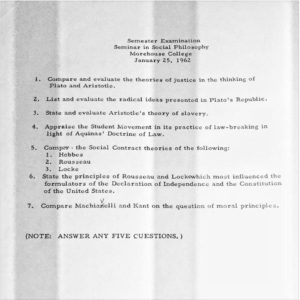Racism is often alluded to as if it were monolithic or uniform: in fact it is multiform. As women we need to develop a language in which to describe the forms that directly affect our relationships with each other. I believe that white feminists today, raised in a racist society, are often ridden with white solipsism — not the consciously held belief that one race is inherently superior to all others, but a tunnel-vision which simply does not see nonwhite experience or existence as precious or significant, unless in spasmodic, impotent guilt-reflexes, which have little or no long-term continuing momentum or political usefulness.
— Adrienne Rich, “Disloyal to Civilization: Feminism, Racism, Gynephobia”
A few years ago, I delivered a talk based on this project before a group of mostly historians. At the conclusion of my talk, a white (male) senior scholar started off by asking me to further explain why I had referred to these women as “theorists” — a term that clearly made him feel uneasy. I explained, as best as I could, that there was nothing especially novel about the term. Indeed, a theorist is one who simply theorizes or crafts ideas concerning a range of issues. He persisted to ask me to explain further, noting that he understood Karl Marx, for example, to be a theorist but felt like I was simply trying to exaggerate these women’s significance and influence by labeling them “theorists.” Maybe they were activists. But, certainly not theorists. Somehow he had missed the point of my entire presentation — carefully crafted (or so I thought) to demonstrate exactly how these women theorized black internationalism, often forging idiosyncratic political philosophies that drew on (and at times departed from) a range of political figures including Marcus Garvey and Noble Drew Ali. We went back and forth for several minutes until his colleagues grew exasperated by his line of questioning and jumped in to redirect the conversation.
— By Keisha N. Blain, “Writing Black Women’s Intellectual History,” Black Perspectives
Saidiya Hartman delivered a lecture in Amsterdam in 2013, focusing on the story of the brutal torture and murder of an enslaved African girl by a ship’s European captain during the Middle Passage. After the reading, the air in the room weighed heavy with the girl’s story of unimaginable suffering. And yet the atmosphere was rapidly shattered by the first white interjection to follow the story, delivered in the form of the words: “But what about the captain?” To the consternation of many others present, whose thoughts were with the enslaved girl and her suffering, the intervenor wanted to know more about the motivations and fate of the perpetrator.
— Lisa Tilley, “But what about the aid worker?”, Al Jazeera
“Bullshit!” That was the immediate response of a white student after I gave a lecture exploring the interstitial “race” dynamics theorized in the elevator example, explored in chapter I, where my body is confiscated and marked as dangerous. I was invited to a class on multiculturalism to talk about whiteness and the Black body. The majority of the class was white. Having given a variation of this lecture before, I had become used to hands being raised in eagerness, if only then to have my interlocutor launch into a diatribe aimed at finding holes in my presentation, but never a definitive “Bullshit!” I was particularly struck by the harsh tone of her response and the look of self-certainty that appeared on her face. Much needs to be explored in terms of the communicational dynamics that arise within contexts where Black bodies (in this case, a Black male body) speak openly and honestly about issues of whiteness to a mostly white audience. On the one hand because I am Black, I am already the racially marked body that is expected to be able to say something knowledgeable, meaningful, and important about race. On the other hand, when that knowledge exposes the racist operations of white bodies, marks them as raced and racist, I am deemed either overly sensitive or too quick to generalize to all whites what I have experienced on the basis of a “few unfortunate events” or “exceptional cases.”
— George Yancy, Black Bodies, White Gazes
